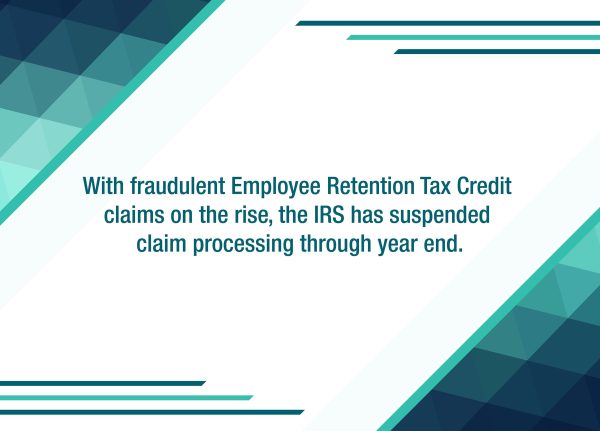Modern cybercriminals have become increasingly sophisticated at manipulation, leaving organizations vulnerable to financial losses, data breaches, and reputational damage. In recent years, these orchestrated scams shifted to target stored data, compromise business emails, and deploy fake apps that will steal organizational and intellectual property. Professionals must remain vigilant and informed about the latest tactics employed […]
An employee stock ownership plan (ESOP) can facilitate the transfer of a business to the owner’s children or employees over a period of years in a tax-advantaged way. However, the IRS recently issued a statement warning businesses about a range of compliance issues related to ESOPs and announcing plans to ramp up compliance enforcement. The […]
This year, many Americans have been victimized by wildfires, severe storms, flooding, tornadoes and other disasters. No matter where you live, unexpected disasters may cause damage to your home or personal property. Before the Tax Cuts and Jobs Act (TCJA), eligible casualty loss victims could claim a deduction on their tax returns. But currently, there […]
As digital threats loom around every corner, the traditional, or most simplistic, approach to protecting digital assets has become insufficient. Many organizations are grappling with the ever-rising threat level and the overall protection of their internal networks. In recent years, information security professionals have identified Zero Trust as the go-to strategy to overcome cyber threats. […]
On August 30, 2023, the Financial Accounting Standards Board (FASB) unanimously voted to finalize its proposed improvements to the disclosure rules for income taxes. Here’s what’s changing and when those changes are effective. Rate reconciliation Under the updated guidance, companies will be required to provide a breakout of amounts paid for taxes between federal, state, and […]
Some assets pose more of a challenge than others when it comes to valuing and accounting for them in an estate plan. Take, for instance, an art collection. If you possess paintings, sculptures or other pieces of art, they may represent a significant portion of your estate. Here are a few options available to address […]
It will likely come as little surprise that the cost of health care benefits for employers is expected to rise in 2024. Inflation, though not out of control, remains a persistent problem. Many industries also still face shortages of skilled labor — meaning organizations must offer higher cost benefits to compete for talent. Preliminary results […]
In the face of a flood of illegitimate claims for the Employee Retention Tax Credit (ERTC), the IRS has imposed an immediate moratorium through at least the end of 2023 on processing new claims for the credit. The reason the IRS cites for the move is the risk of honest small business owners being scammed […]
If your investments have fluctuated wildly this year, you may have already recognized some significant gains and losses. But nothing is decided tax-wise until year end when the final results of your trades will reveal your 2023 tax situation. Here’s what you need to know to avoid tax surprises. Tax-favored retirement accounts and taxable accounts […]
On September 6, the Financial Accounting Standards Board (FASB) unanimously voted to finalize new accounting rules on cryptocurrency assets — less than five months after the proposed standard was issued for public comment. Here’s what companies that hold these assets should know. Need for change The updated guidance is the first explicit accounting standard on […]
Does your business work on projects that take longer than a year to complete? Recognizing revenue from long-term projects usually requires use of the “percentage-of-completion” method. Here’s an overview of when it’s required and how it works. Completed contract vs. percentage-of-completion Homebuilders, developers, creative agencies, engineering firms and others who perform work on long-term contracts […]
Portability helps minimize federal gift and estate tax by allowing a surviving spouse to use a deceased spouse’s unused gift and estate tax exemption amount. Currently, the exemption is $12.92 million, but it’s scheduled to return to an inflation-adjusted $5 million on January 1, 2026. Unfortunately, portability isn’t automatically available; it requires the deceased spouse’s executor […]












